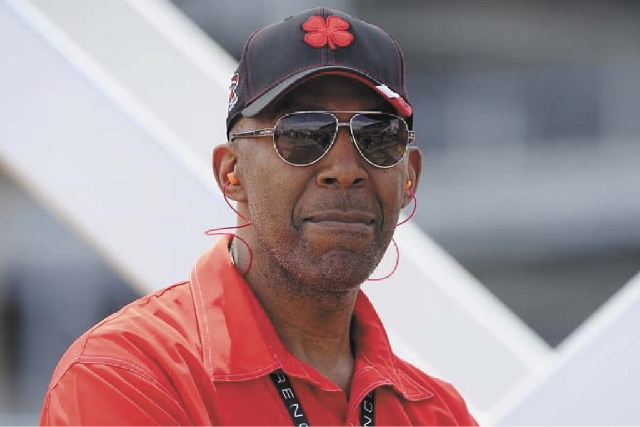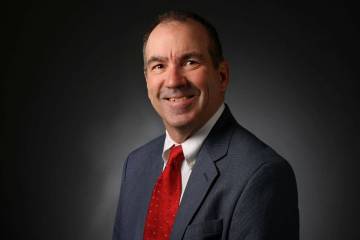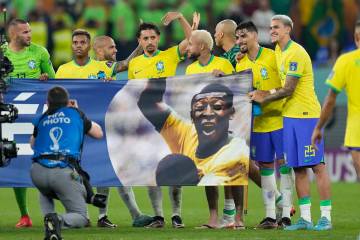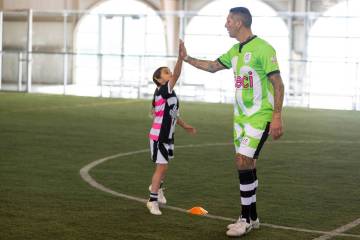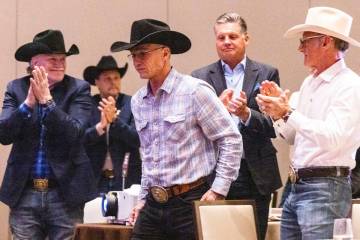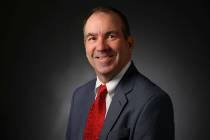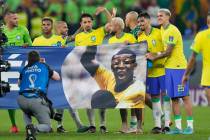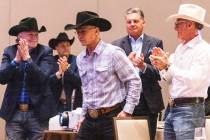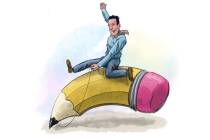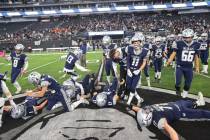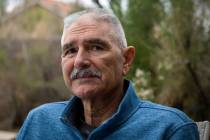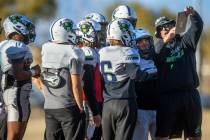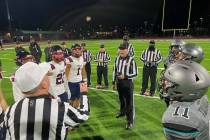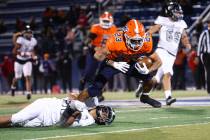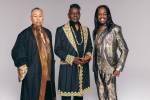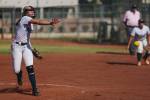Three decades after N.C. State’s miracle, Bailey still living lucky
It was a Monday morning in April in New Mexico exactly 30 years ago, discounting intervening leap years, and the skies over the Four Corners were turning gray and menacing. A stinging chill was in the air. You could tell it was going to snow.
I had a friend in Albuquerque who had finagled an extra ticket for that night’s NCAA basketball championship game from Ray Meyer, the old DePaul coach. But driving the 180 miles from the Four Corners to Albuquerque on New Mexico State Highway 44, then a two-lane road, was something best left to “Ice Road Truckers,” though it would be decades before we knew them as such.
“Nah,” I told my pal. “Better not risk it. Besides, it’s probably gonna be a blowout.”
When I shared that story with Thurl Bailey at The Strip at Las Vegas Motor Speedway on Saturday afternoon, he slapped me on the knee and we both began to laugh.
“After watching that Louisville semifinal, there was a little bit of doubt on our side, too,” said the slender 6-foot-11-inch giant who once lived at The Lakes before moving back to the Salt Lake City area — where he had played for the Jazz and been their captain — to start a family with his wife, Sindi.
The Louisville semifinal was Louisville vs. Houston in the 1983 Final Four, when Akeem Olajuwon — this was before the “H” was added to his name — and Clyde Drexler and that bunch known as Phi Slama Jama, and Denny Crum’s similar crew of high fliers, engaged in a dunkfest that left jaws agape from there to Truth or Consequences.
Bailey’s side was North Carolina State, the longest of long shots, which had upset Georgia in the first national semifinal on Saturday. A lot of people were calling that the junior varsity game.
Two days later it was snowing outside. The replays show six seconds remained when Thurl Bailey, No. 41 in red, threw the ball from the left corner out, way out, to Dereck Whittenburg, No. 25. Benny Anders, No. 32 in white, flashed in front of Whittenburg with a flailing arm.
“Benny Anders nearly got his hand on it,” Bailey said, every moment of the last sequence indelibly etched into memory, like one’s first kiss, or where one was when President Kennedy was shot. “Whit calls it an ill-advised pass.”
Bailey, who turned 52 Sunday, remembers getting himself into rebounding position to the left side of the basket. He could see Whit’s heave was going to be short. And wide right. Where was Olajuwon?
Olajuwon must have thought Anders was going to steal Bailey’s pass, too, because he had taken a giant step in the other direction.
Lorenzo Charles, No. 43 in red, slid in behind him.
“Whittenburg ... oh, it’s a long way,” Gary Bender told viewers, snowed-in and otherwise.
And then they won it. On the dunk.
Charles, who had jammed the ball into the basket, capping N.C. State’s amazing title run of taut and narrow victories, had a blank expression on his face. So did Jim Valvano, his coach. Only Valvano was running, dazed and confused, around the floor at The Pit. Did he ever find somebody to hug?
And now it’s almost exactly 30 years later, and I’m chatting with the guy who made the last pass, who led N.C. State with 15 points in that game, and the only thing that has changed about Thurl Bailey is instead of a white painter’s cap, which is how I remember him after the 1983 championship game, he’s now wearing a black cap with a red four-leaf clover on front.
Bailey is vice president of corporate sales for Black Clover, a sponsor of Steve Torrence’s NHRA Top Fuel dragster. “Live Lucky” it says on the bill of the cap.
Live lucky. Like that pass to Whittenburg from deep in the corner. Like his 12-year NBA career, his successful life after basketball as an analyst for the Utah Jazz and Utes, businessman, public speaker, singer-songwriter, philanthropist, family man.
It was a couple of years ago when a filmmaker received a call from Whittenburg, who noted it was coming up on 30 years since N.C. State had won it, on the dunk.
Whit was missing his teammates. Coach V was gone, having lost his courageous fight against cancer in 1993, but it would be neat to see the rest of the guys. And, he told the filmmaker, Jonathan Hock, maybe that could be the basis of a documentary or something.
Two days later, Lo Charles was dead. He was killed when the rented tour bus he was driving alone crashed on Interstate 40 in Raleigh, not far from the N.C. State campus.
So the reunion was terribly bittersweet. But the ESPN documentary, called “Survive and Advance,” will bring tears to your eyes, and now Thurl Bailey is getting asked the same questions he has been getting asked for 30 years.
When I asked if he ever gets tired of answering them, he smiled warmly and said “no, never,” and then he unfolded his legs from the chair in the press room to make his way down to the track, where Torrence soon would be making a qualifying run.
A few minutes later, the track announcer would spot Thurl Bailey among the throng of nitromethane addicts, because he’s sort of hard to miss, and then the track announcer would reach up high with the microphone and ask about beating Houston, on the dunk.
Las Vegas Review-Journal sports columnist Ron Kantowski can be reached at rkantowski@reviewjournal.com or 702-383-0352. Follow him on Twitter: @ronkantowski.



